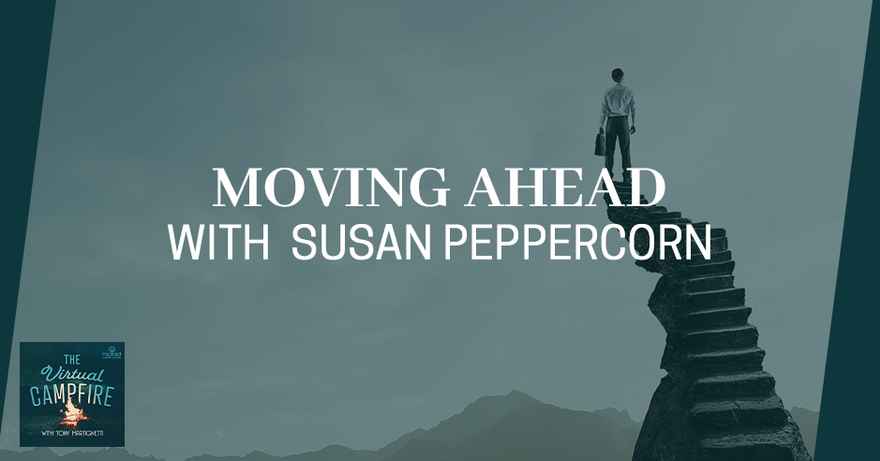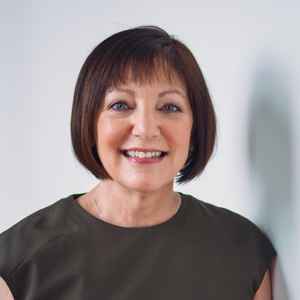Moving Ahead With Susan Peppercorn

We should know how to survive and embrace the long, difficult road we should take. The bumpy roads are lessons that will shape us to be the best versions of ourselves. Join Tony Martignetti and Susan Peppercorn as they delve into making decisions, structure, purpose, creativity, and learning to move ahead in life. Susan Peppercorn is an executive coach, writer, and author of the bestselling book Ditch Your Inner Critic: Evidence-Based Strategies to Thrive in Your Career.
In this episode, she shares her professional experiences and how she started her career path in technology sales and why she knew she was meant for something else. She discusses the rare definition of marketing as customer-oriented, why questions are often more beneficial than orders, and the emphasis of value over numbers in sales. She notes the danger of self-limiting beliefs, shares stories of her clients’ journeys and successes, and speaks on the importance and difficulty of letting people struggle.
Listen to the podcast here:
Moving Ahead With Susan Peppercorn
It is my honor to introduce you to my guest, Susan Peppercorn. She is an Executive Coach, writer and speaker who helps professionals to make successful career choices that align with their values, interests and strengths. She has coached clients from a vast array of industries and functions, including healthcare, higher education, financial services, marketing and technology. She is a regular contributor to Harvard Business Review, Fast Company and is the author of the bestselling book . She’s 1 of fewer than 100 coaches worldwide certified in Stanford’s Design Your Life methodology. When she’s not working, you can find her riding her bicycle in the suburbs of Boston. Welcome to the show.
Thank you so much, Tony. It is a pleasure to be here.
I’m thrilled to find out what’s brought you to this place in the world and making such a big impact. I know I have had the pleasure of working with you as a colleague and have seen firsthand the impact you can make on people. I’m thrilled to have you here.

Thank you. What brought me here was a very circuitous route to getting here.
On the show, we talk about what’s called flashpoints. These are points in people’s stories that ignited their gifts to the world. What I’m going to do is I’m going to allow you to have a space to share what you are called to share. Along the way, we are going to pause and see what shows up, see what themes and things that we will find along the way. When you are ready, I’m going to turn the floor over to you and I will let you reap.
My flashpoint was my low point. I started out my career as a musician. I have two degrees, in Music and Performance. I realized early on that if I wanted to be able to keep a roof over my head that I wasn’t going to be able to do it as a musician. I needed to earn a living and did not have enough money to go back to school. I decided to go into technology sales, which was a burgeoning industry at the time. Fast forward a short bit, I was the youngest female sales manager in a technology company. I became the first female sales manager responsible for a Money Center Bank in New York City where my clients were twice my age. I was about maybe 25. They were all over 50.
We have to let people struggle and feel their feelings. It doesn’t help if they keep them bottled up. They have to get out.
I stayed with that company for many years. First in sales and then in marketing. Eventually, that company was sold. I begged my boss to lay me off because the company was downsizing. When the company was acquired and going through downsizing, eventually, my boss said, “I will do that.” I found myself without a job. Not only without a job but a purpose, meaning and structure. During those fifteen years that I was there, I hated the technology industry. I was there because I needed to earn a good living. It fulfilled that goal but all of the other goals that we seek when we are in a career and in the job did not do for me. When I left, I had no idea what I wanted to do, where I wanted to go and I was at a low point.
The only thing that I knew was that I wanted to work closer to home because I had been commuting almost two hours a day. My children were young and I didn’t want to do that anymore. I floundered. That’s the only way that I could describe what happened. Fortunately, I had a network and lived in a town that had two colleges. Somebody that I knew that worked at a college said, “Why don’t you come and work here?” Since I had a business development background, I did business development at one of the local colleges for their executive education program, which I did enjoy. 9/11 happened and I realized I could no longer get on a plane and start traveling around to meet with clients.
I faced another change. Again, through my network, I was recruited to join the Career Center at Boston University School of Management, where I was hired to recruit companies to interview and hopefully hire MBA students. The thread through all of this was my business development background because I started in sales. I did business development for one college and executive education, then I went to a second college and did a form of business development to bring employers to campus. Through all of this, I never knew what I wanted to do. There was always this question. I was employed and making the money that I needed to make. What was fortuitous for me is that I started to coach MBA students because when I brought employers to campus, I would need to make sure that the students were prepared. After all, if they weren’t, then it would reflect on me.

When I started to coach the students on interviewing and how to prepare for these interviews, the light bulb went on suddenly. It’s like, “I love this,” if you follow my trajectory, this is twenty years since the start of my career, all of this time. What I didn’t explain is there was a traumatic experience that happened when I was in this technology company. I had a client that was not a friend of my firm. She was planted by the competitor, which the competitor used to do frequently. She was also not in a position to purchase. She was an advisor. Salespeople know you don’t spend time with advisors. You spend time with people that can spend money. I ignored her and had my team ignore her. One day, I get a call from the US Vice President of Sales on a Sunday morning that said, “Why is your client in The Boston Globe speaking so disparagingly about our salespeople?”
It was an article comparing the salespeople in our company to IBM salespeople. They had called on her as someone to give her opinion. I was literally in the hot seat over this. It was on the front page of the business section. This was a traumatic experience for me to have something like this happen. Interestingly, I didn’t get fired, which I thought I was going to be. I developed a good relationship with her afterward. That’s a long story. Everything I learned about corporate politics, I learned as this young sales manager working for this tech company but I had no mentors. I had no one to guide me.
When I left that company and I went to two institutes of higher education, I doubted myself. It’s like, “What do I have to offer?” because I saw myself as a failure, given what had happened to me. Only in retrospect, I was able to look back at the situation and say, “Where were the managers? Where were they to help guide me through this very difficult situation?” Anyway, when I started to coach students at Boston University, I realized how much I love doing that because they were so grateful for the coaching that they received, especially when it made a difference to them on interviews. It was the first time in my career that I realized, “I can have an impact. I can make a difference.”
What I found working for a large company is that it’s hard to have an impact. A lot of people are satisfied with large companies moving the rock a little bit up the hill but I was never that person. Even when I went into marketing, I would say, “How is this going to benefit the customer?” I did not work for a customer-centric company. It was an engineering company so they didn’t understand my question. One of the things that always drove me was wanting to have an impact, although I didn’t realize it at the time. The thing about coaching that I love is the fact that through the power of coaching and questions, which as a coach, you know questions are so powerful because you are not telling someone what to do. You are asking them questions so that they can gain insight into their own thinking and motivations. By doing that, they can then tap into their own inner wisdom to make decisions to move forward. To me, there’s nothing more exciting than being able to do that.
Life is about developing relationships.
The reason that I chose career coaching in particular because I am a Certified Executive Coach but I stayed with career coaching because I never had anyone to guide me. I didn’t want it to be as difficult for other people as it was for me wandering around in the dark, not knowing what direction to go in, figuring it out on my own and being fortunate enough eventually overtime to do that. You know this, Tony, from your own experience, there are ways to guide people and help them. It’s so powerful but it truly was a low point for me where I felt hopeless and directionless. In my upbringing, my father who had a Law degree was a civil servant for 35 years. When I graduated college, he said, “Get a job in civil service.” I said, “Over my dead body will I do that” For him, it was all about security. That was what most important.
There are many great insights that I want to pull apart a little bit more. There’s an element of hearing that sales and business development are a great fertile place to learn about being out there, putting yourself out there and exposing yourself to all the risks of what could go wrong and what could go right. Being out there exposed. What I hear a lot is that when you do that, it builds a lot of muscles that when you do something else in the future, you can always come back to that experience and build from that.
I went through some of the best sales training in the industry. It’s very funny because when you go through the sales training, you think, “I’ve got this,” but when you get out there in the field in front of real customers, you have no idea. What was interesting to me, I never had female role models. I worked for male managers. As much as I respected them and I did, they were all about the numbers. “Are you going to make your number this quarter? What do you have to do to make your number this quarter?” To get into the strategy of what do we do with this client and how do we move them forward, that was not there.
I was constantly figuring it out on my own. What I realized and it took me time, I had to figure it out by myself, it was about developing relationships. This one client that I said had spoken so disparagingly about our sales reps, I figured out how to develop a relationship with her because I gave money to her favorite charity. There was a charity that all the senior executives in the bank gave to every year. They had a big fundraiser at the end of the year. Everyone was invited to this fundraiser. It was a very big deal. I used to give to the fundraiser and write it off in small increments on my expense report. When she saw that I started to donate to this charity, all of a sudden, a relationship started to form. I realized that that’s what selling was about, it was about relationships. It wasn’t about making your quota and how much equipment you are going to sell. I also realized it was about making your customers successful. These are things they don’t teach you in sales school.
You made me think about something else and it ties back to what you said around connecting with what people value is what builds that relationship, too. You said about making an impact. That’s what people have traded off from before, now it’s like, “It’s not about making money. It’s about making an impact.” When you start to see what people value and what impact they want to make and you contribute to that in some way, that’s powerful. When I think of your story, I think of like, “Here’s someone who is now seeing that the impact you can have is on helping these MBAs, the people in the school system to be able to see what impact they can have in the world by understanding them by seeing what they need.” You are fulfilled because you see the impact you can have. What started to percolate in my mind is that whole path. It’s very interesting to see how that changes from seeing the numbers to the value being the driver. It’s coming from that place of service leadership.

What I’m seeing now in the COVID world is that service being the driver, people want to lead with that. If they have the financial wherewithal, which you have to have, I’m seeing people more willing to take the risk to lead with that than they might have been willing to do before. I hadn’t seen it in quite the same way. It’s exciting to see that and be part of that. Be part of someone’s journey that says, “I don’t want to do the status quo anymore. I want to make a difference in a significant way.”
You started your career in pursuit of music. Do you miss music? Do you still connect with it or are there elements of you that still pull back to that musical part of who you are?
Music is still part of my life. I love to sing so I can do that any time in any place. The flute was my instrument and that’s what I played professionally. I don’t play the flute anymore but I do love to sing. Singing was always part of who I was, even back as a student so that’s still there. Writing for me is a way of expressing my creativity. It’s an outlet. It’s just a different way of expressing it.
I like that you put it that way because there’s an element of sometimes you need to get something out of you and when you are born a creative or when you are born with that creativity, whether it be music or something and you stop, you still have to get it out there. Seeing that you are still doing it in a way that still allows you to have an outlet but also express yourself to people who can receive it in a very powerful way. Coaching in its own way is a gift. It’s a creative outlet.
Everybody is creative. There’s a great book called The Myths of Creativity by David Burkus. One of the myths that he talks about is we think that creativity has to be something fully original but that’s not true. There is no such thing as something being original. Everything originated already and came from somewhere. I’m a good curator so I like to curate ideas. That’s what interests me so I like to pull from different places, curate it and pull it together. A lot of writers do that. Podcasting is creative. That’s not my form of creativity but a lot of people don’t think of themselves as being creative because they think that it has to be original but it doesn’t. Looking at something differently or solving a problem, approaching a problem differently than it has been approached before is another form of creativity.
With your clients, what are you seeing people limit themselves most when they come to you for coaching? Are you seeing them saying that, “I can’t do that because of this?” What is the thing that you see most?
Self-limiting beliefs in general are the things that keep people stuck. People who are too hard on themselves or somebody who will say, “I can’t apply for that job because I have only done 70% of what’s in the job description.” I’m sure you have heard that, too. I will give you an example. Someone had called me because they said that they were finalists in interviews but they were never getting the job. When I probed as to why, they said, in their last job, they didn’t have clear measurements. I said, “Can you tell me what you mean by that? Maybe your manager didn’t have clear measurements but how did you measure yourself?” We discussed this a bit. This was somebody in fundraising. I should explain that.
Fundraisers have clear measurements. You talk to a prospective client and either you bring in a certain amount of money from that, you bring in the gift or you don’t bring in the gift. That’s how a fundraiser measures. This person was working for a prestigious university and he gave me all the reasons why he couldn’t measure. I said, “Tell me about some of the gifts that you brought in when you were there.” He told me about a story where the largest gift to the university came in because he advised as to how the gift could be structured. The tax structure, the stock transfer, whatever it might be but he was not the one who talked to the giver. I said, “Would that gift have come in without your guidance?”
We're not here to deplete. We're here to serve.
He said, “No.” I said, “You brought that gift in, didn’t you?” He said, “Yes, I did.” I said, “You need to claim ownership for it and explain what you did,” but it was all the self-talk in his head. I’m not the one that had the conversation with the person. I gave the information to someone else who conveyed the information to the client. The person who conveyed the information was the one who closed the gift but when I said to him, “Would this have happened without your guidance?” His answer was no. It was in the negative self-talk. All these parameters that this individual was constructing that somebody else who would have been evaluating this individual as a prospective employee would not have constructed.
It’s a beautiful example. I love that because it illustrates the point so well and so many people don’t see their gifts. This is the perfect way to explain how a coach, especially a career coach, can help someone to see that in themselves. Thank you for sharing that. What is the thing that you have learned that has been the most powerful lesson for you along your journey?
One of the things that I have learned is to let people struggle. As a coach, that’s hard. I have a former client. Probably for four meetings, she sobbed through every meeting that we had. There were times when she had left and I would say to myself, “Can I help her?” One day, I was thinking about the situation and what I wanted to do in the meetings, I wanted to dry her tears. I wanted to say to her, “It’s going to be okay,” but something stopped me. I said to myself, “She needs to feel these feelings. She has been bottling them up for months, years or however long. These feelings have to get out. As the coach, I have to bear witness to them. I have to allow a space for them without rescuing her.”
It’s the hardest thing that I have ever done. I was thinking about her situation one day. I said to her, “Are you willing to try something with me? I’m not sure how this is going to work and if it will work.” I suggested an exercise. Honestly, Tony, I didn’t know if it was going to work. You may be familiar with it. It’s called the Reflected Best Self. It was created at the University of Michigan’s Business School. She was so down on herself which was the problem. This narrative in her head was, “How can I ever leave where I am. I can see how I’m going to get out of here. This was over and over again.”
I said, “Let’s try this.” The way the exercises works is you ask 15 or 20 people who know you well to reflect on a time when they have seen you at your best. You send them an explanation, “Can you send me an email when you recall a time when you have seen me at my best? What was I doing? What strengths do you see me using at the time?” She said to me, “I will try it,” so she did and it was amazing. Everyone responded and what happens is what often happens with this particular exercise. It was a theme that arose in the responses that focused on certain strengths that she has that she wasn’t even aware of because she was so caught up in the negativity.
She was so appreciative and grateful that people took the time to write back to her. She was like, “People wrote back to me.” They were lengthy stories that they told her. She said to me after this, “You know what I have wanted to do, Susan, is I wanted to become a coach but I have been too scared.” She applied for the executive coaching program at Georgetown, which has a very low admission rate. She wrote in her application about using this particular exercise and she got accepted. Now, she is a wildly successful executive coach. If I tell you how scared and worried I was, I didn’t know if I could help her, and to let someone cry like that in the depths of their despair and make space for that was probably the hardest thing I ever had to do.
The energetic shift of that story is amazing. The bravery that you put into taking that leap and see if it would work and it did, that’s powerful. The thing that came to mind for me was that we are not here to deplete. We are here to serve. If we constantly try to please people, then what we are going to get is a bunch of unhappy customers who don’t get what they want. If you serve, service is not always clear. Sometimes it means taking those leaps into the unknown. That’s what you modeled there. That’s true service.
It was taking a leap into the unknown because there could have been the chance that I could not have helped her. I would have had to admit that and say, “I’m sorry but I can’t.”
It’s gratifying, too, when you look back at that story. It gives you fuel for continuing on your days when the days are tough and you look back and say, “I have that story to Fill me up.” Before we come to a close, is there anything else that you wanted to say in terms of any takeaways that you have had from your journey that you wanted to share? Any brief ones?
It’s okay to be lost. I heard it. I was teaching a webinar. We had a small group. One of the people said, “I have had a varied career path, not like most people.” She assumed that most people have a straight-line career path. Tony, you and I know how infrequent that is. I was teaching with a colleague and we both shared our careers stories. Both of us have diverse career paths. She had such an interesting career story when she talked about it but it’s okay to feel lost and to allow yourself that space to say, “I don’t know but I will figure it out.”
One last question. What is one book that has changed your life or had an impact on your life?
There is a number but this is one that I’m reading. I will share it with you. It’s called The Second Mountain by David Brooks. It’s called The Second Mountain but the subheading is, Quest for a Moral Life. David Brooks is a writer for the New York Times, amongst other things. I love this book because it speaks volumes about the divide in our country. By that, I mean the I, me, I am for myself versus the people that are thinking about being there for other people. The premise that he makes in this book is that the first mountain is about what we would think of as a more traditional career path. Going up the mountain to get promoted, to get the bigger salary and to get the larger title. It’s about the external rewards.
The second mountain is about doing things for a purpose and meaning. What I also love about it is how he talks about the fact that he wrote this book because his life fell apart. He realized that he was going up the first mountain, then his wife said to him, “I’m tired of you going up the first mountain and forgetting about the people that you love because you are never there for them.” He had that a-ha moment when his life fell apart and said, “What’s going on here?” I don’t love all of the books but it’s about stories of people who have pursued meaning and purpose, largely at the expense of money and status.
It’s a great book, too. I have read it. It is challenging at times to read but it’s good. Susan, this was amazing. More insights than I could even handle. The stories are powerful. Thank you so much for coming on and sharing them.
Thank you for the opportunity, Tony. I appreciate it.
Thank you. I also want to give people an opportunity to know where they can find you so they can reach out.
You can find me on LinkedIn. I will put in a little plug. I have a new newsletter on LinkedIn. It’s called Get Hired Now with Susan Peppercorn so feel free to subscribe there. I have a website, Positive Workplace Partners. You can also find me there. I’m also on Twitter and Facebook, all of the social media places but feel free to connect with me on LinkedIn. That’s the place you find me the most.
I recommend reaching out to Susan because she is fantastic. Great insights. You will see her on HBR and Fast Company, all over the place. Thank you so much to the readers for coming on the journey with us.
Important Links:
- Susan Peppercorn
- Ditch Your Inner Critic At Work: Evidence-Based Strategies To Thrive in Your Career
- The Myths of Creativity
- Reflected Best Self
- The Second Mountain
- LinkedIn – Susan Peppercorn
- Get Hired Now with Susan Peppercorn
- Positive Workplace Partners
- Twitter – Susan Peppercorn
- Facebook – Susan Peppercorn
About Susan Peppercorn
 I'm an executive and career management coach helping professionals succeed in existing roles, pivot to something new, or onboard into a position they’ve accepted. I also help clients communicate their brand, so others understand their professional vision and value. I have coached clients from companies, including Novartis Pharmaceuticals, MIT, and State Street Global Advisors.
I'm an executive and career management coach helping professionals succeed in existing roles, pivot to something new, or onboard into a position they’ve accepted. I also help clients communicate their brand, so others understand their professional vision and value. I have coached clients from companies, including Novartis Pharmaceuticals, MIT, and State Street Global Advisors.Love the show? Subscribe, rate, review, and share! https://www.inspiredpurposecoach.com/virtualcampfire


0 comments
Leave a comment
Please log in or register to post a comment